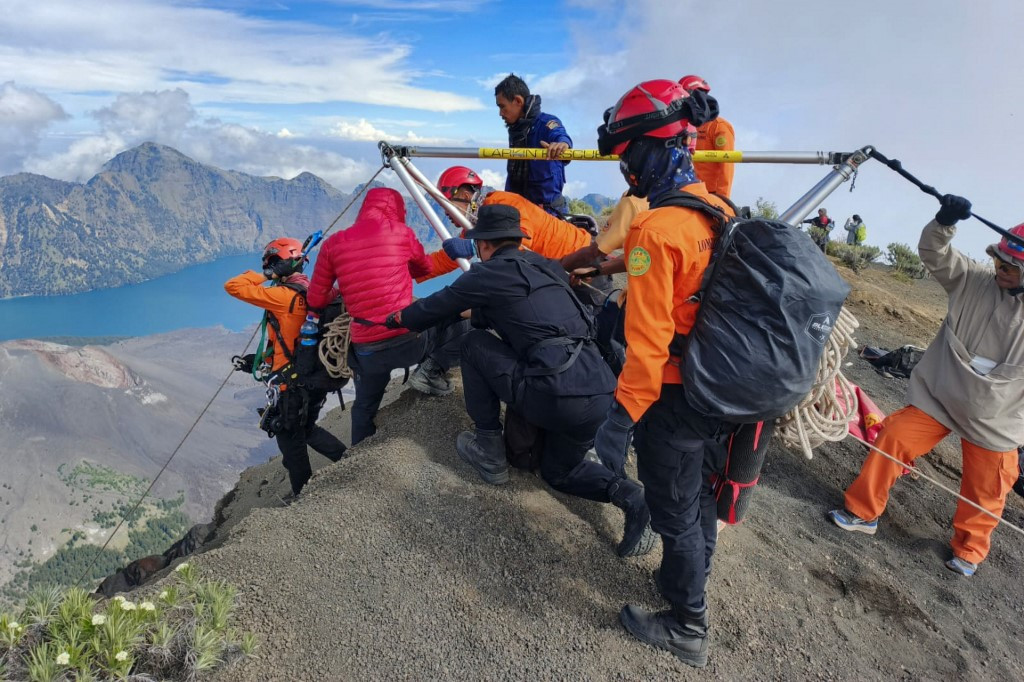Popular Reads
Top Results
Can't find what you're looking for?
View all search resultsPopular Reads
Top Results
Can't find what you're looking for?
View all search resultsClimbing should never kill
In the aftermath of the Rinjani tragedy, many hikers have criticized Indonesia’s tourism system for prioritizing commercial interests over the safety of its visitors.
Change text size
Gift Premium Articles
to Anyone
T
he safety standard of Indonesia’s tourism industry has come under intense international scrutiny following the tragic death of Brazilian tourist Juliana De Souza Pereira Marins.
On June 21, Marins, 27, fell while climbing Mount Rinjani, the country’s second-highest volcano, situated on Lombok Island, West Nusa Tenggara. Her body was recovered four days later from a ravine approximately 600 meters deep near Cemara Nunggal, a narrow and precarious section of the trail close to the summit.
Initial drone footage taken shortly after the fall showed her sitting upright partway down a 200-meter-deep slope, indicating she had survived the initial impact. However, when rescuers reached the site later that evening, she was nowhere to be found.
An autopsy conducted at a hospital in Bali on June 26 concluded that Marins died from internal organ damage and bleeding caused by injuries sustained in the fall. She was believed to have died within 20 minutes of a second plunge into a deeper ravine.
Despite the search and rescue team’s relentless efforts from day one, including navigating treacherous terrain and unpredictable weather that put their own lives at risk, public outrage remained unabated. Many Brazilians took to social media to condemn what they saw as Indonesia’s inadequate rescue system, insisting that Marins did not die simply because of the fall, but due to neglect.
Most recently, the Brazilian government has signaled its intention to pursue international legal action over the case, formally requesting the Federal Police Superintendence in Rio de Janeiro to investigate possible negligence on the part of Indonesian authorities.
We cannot deny the truth behind that sentiment: Marins’ life might have been saved if help had arrived sooner. This was affirmed by Abdul Haris Agam, popularly known as Agam Rinjani, an experienced tour operator and volunteer who played a key role in retrieving Marins’ body and has since been hailed as a hero by many Brazilians.
Having taken part in numerous evacuation efforts on the 3,726-meter mountain, Agam said Marins’ rescue could have been carried out soon after her initial fall had essential equipment, including ropes, been available at critical points along the trail. He also pointed to the lack of proper rescue training among the mountain’s tour guides and porters.
The 36-year-old further revealed that no helicopter rescue drills have ever been conducted along hazardous trails, despite similar accidents having occurred in the past. In October last year, Irish climber Farrel Paul slipped into a ravine close to the mount’s summit but was quickly rescued by Agam, who happened to be nearby with a team evacuating the body of another local climber, Kaifat Rafi Mubarok.
In response to the widespread international backlash, the Indonesian government pledged to improve standard operating procedures for climbing Mt. Rinjani and other popular hiking destinations across the archipelago, renowned for its towering volcanoes. However, superficial measures alone will not be enough.
This effort must go hand in hand with broader reforms in tourism management, including limiting the number of visitors to prioritize safety. In the aftermath of the Rinjani tragedy, many hikers have criticized Indonesia’s tourism system for prioritizing commercial interests over the safety of its visitors.
By contrast, Mt. Kinabalu in neighboring Malaysia is widely regarded as a model of responsible management. The number of climbers is capped at just 120 per day, far fewer than Rinjani’s 700-person daily limit. Each pair of climbers is accompanied by a licensed guide, significantly reducing the risk of negligence. Marins, in comparison, was reportedly left behind by her guide and group at Cemara Nunggal after struggling to continue her ascent to the summit.
Her tragic death should serve as a reminder that amid the rapid growth of tourism and the development of nature-based destinations, safety and humanity must never be overlooked. May Marins’ tragedy prompt reflection and reform among all stakeholders, including hikers themselves, who must be both physically and mentally prepared before taking on such demanding journeys.










